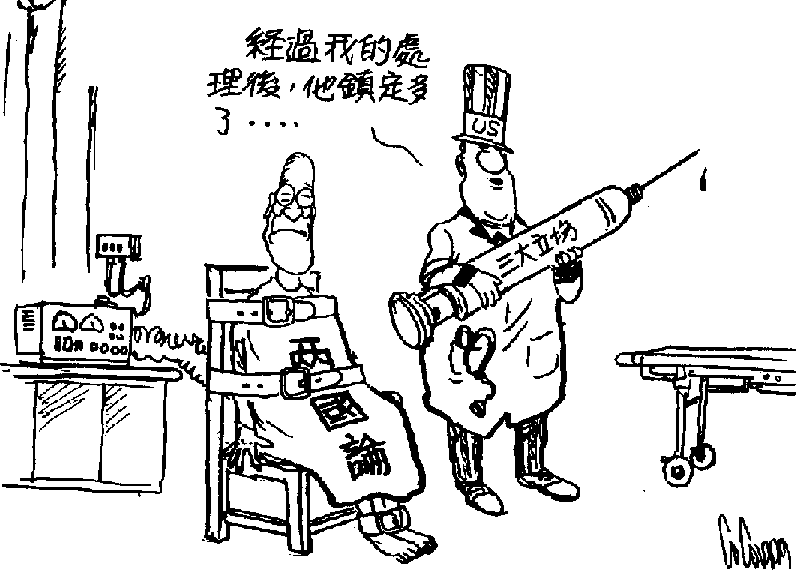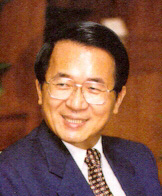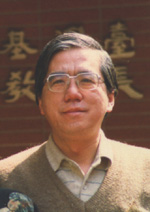 Taiwan
Communiqué No. 87, August 1999
Taiwan
Communiqué No. 87, August 1999
Let Taiwan be Taiwan
Editorial
We want to emphasize that the Taiwanese people were never consulted in
the formulation of the "One China"
policy, which presently prevents Taiwan from being accepted as a full and
equal member in the international community.
While it may have been a convenient fiction, devised by Mr. Kissinger at
the behest of the equally repressive Messrs. Mao Tse-tung and Chiang
Kai-shek, it was a running time bomb, because it failed to incorporate the
aspirations of the people of Taiwan to be accepted as a free and
democratic nation.
Furthermore, while the U.S. — and the Clinton Administration in
particular — always speaks highly of the principles of freedom and
democracy, in practice the U.S. has isolated a democratic Taiwan and
pushed it into an inferior negotiating position. It "engaged"
Communist China, and relegated Taiwan to second-class international
citizenship.
The conflict between the two countries can only be resolved if China
accepts Taiwan as a friendly neighbor, and ends the Civil War they fought
against the Kuomintang 50 years ago. We Taiwanese were not a part of that
Civil War and do not want the future of our homeland to be held hostage to
it.
Taiwan is a shining example of the fact that Asian people do want
freedom and full democracy. We urge the US and other Western nations to
support democratically-
elected President Lee and the people of Taiwan in their search for greater
international status, instead of sidelining Taiwan, and relegating the
Taiwanese people to second-class citizenship in the family of nations.
 |
| "Doctor" USA trying to tranquilize
President Lee |
In order to come to fruitful discussions or detente between
China and Taiwan it is essential that China ceases it threats to use
military force against Taiwan. The Clinton Administration has done very
little to achieve this, but has condoned a missile buildup along the
Chinese coast, which is presently ten times as large as the missile force
in Cuba during the 1962 missile crisis.
The US should applaud Mr. Lee's step, and urge China to accept the
reality that Taiwan and China are two neighboring states. The US should
also emphasize that the people of Taiwan have the right to determine their
own future, as was stated so eloquently in the Washington Post editorial
of 14 July 1999 ("Chinese Threats").
Chen Shui-bian: "Let Taiwan decide its own future"
On 28 July 1999, Mr. Chen Shui-bian, the DPP party's candidate in
Taiwan's upcoming presidential elections, said the island should be left
alone to decide its political future and appealed to the world to respect
whichever path it chooses.

"The people of Taiwan have chosen to pursue a
democratic system, to live in a democratic way of life,'' he said. "I
believe all decisions based on democratic process should be respected.
Only the people of Taiwan have the right to choose Taiwan's future and
destiny.''
Chen and his party, whose founding principles seek a sovereign Republic
of Taiwan, supported President Lee Teng-hui's discarding of the ambiguous
"one China'' doctrine that has been the source of tension
with China for decades.
Chen also made clear that Taiwan and the mainland were two separate and
independent nations, which should develop a "special
international relationship." Unlike Lee, who still
espouses an eventual union with the mainland — albeit under a
mutually acceptable democracy — Chen said the issue should be settled
by a referendum.
"Whether the two different countries across the Taiwan
Strait should be unified into a single country in the future needs to be
decided by Taiwan's 22 million residents through a referendum",
he stated. "Neither China's communist leaders nor its 1.2
billion people should have any say over the island's future and destiny",
Chen said.
Chen, who served as Taipei's mayor from 1994 through 1998, said he would
try to maintain peaceful co-existence with the mainland and boost economic
links. "Relations across the Taiwan Strait should be
better, not worse," he said.
Asked whether Beijing's communist leaders would accept his victory, Chen
responded: "It's not the Chinese communists who are
electing the national leader of Taiwan. It's Taiwan's 22 million people
who are choosing their own national leader. It's up to
Taiwan's people, not China or its people, to decide."
Presbyterian Church: an affirmation and an appeal
At the end of July 1999, the Presbyterian Church in Taiwan issued the
following Affirmation and Appeal in response to President
Lee Teng-hui's statement on "nation-to-nation"
relations with China:
An affirmation and an appeal
regarding President Lee Teng-hui's statement on
"The Two-Nation policy"
The Presbyterian Church in Taiwan, based on her understanding and
viewpoint of the Christian faith, is deeply concerned about the
future of Taiwan. In a public statement on "The
Sovereignty of Taiwan" on August 20, 1991 we stated
that "we firmly proclaim that:
- Taiwan is a sovereign country. Taiwan's sovereignty and land
belong to the people of Taiwan.
- Taiwan and China are two different sovereign countries."
We are pleased to see that President Lee Teng-hui has publicly
declared recently that:
- Taiwan is a sovereign, independent nation.
- The two sides of the Taiwan Strait have special "state-to-state
(kok tui kok) relations.
- "One China" does not include
Taiwan.
Our church appreciates the emphasis of President Lee Teng-hui that
Taiwan is a sovereign and independent country, and we strongly
affirm and support this stance. We expect all the people in Taiwan
will recognize, accept, and experience this fact. We expect and hope
that the government and people can cooperate hand-in-hand together
to confirm this status as a nation, including: 
- Forming a new constitution, which clearly defines and affirms
that our land includes Taiwan, the Pescadores, Kinmen, Matsu, and
other related islands, and framing new laws as necessary to
reflect this reality.
- Quickly pass a law or amend the Constitution so that in case of
any threat to or deprivation of the sovereignty of Taiwan, the
people may express their determination to maintain their dignity
and the sovereignty of Taiwan through a plebiscite.
- Our government should use "Taiwan"
as the name of our nation and should positively apply for
membership in the United nations and other international
organizations so that we can vigorously pursue diplomatic
relations with other nations and improve our international status.
Then we can have a new and good relationship with China as well as
other countries in the Asia-Pacific region — based on justice
and peace — respecting and helping each other.
Our Church appeals to the people of Taiwan, if we are faced with
threat or conflict from without or within, to confirm our confidence
and our will to the end that we might bravely create a bright future
for Taiwan — protecting the lives, safety, and freedom of the
people of Taiwan. At the same time, we sincerely appeal to the
ecumenical church and to international societies to accept and
respect our struggle and effort for self-determination as a human
right.
|
Your kingdom is founded on righteousness and justice;
love and faithfulness are shown in all you do. |
| Psalms 89:14 |
T.H. Hsu, Moderator of the 46th General Assembly
William J.K. Lo, General Secretary |
One of the results of the heated debates regarding Taiwan's status
during July/August 1999, was that several international publications took
a welcome closer look at developments in Taiwan itself. Two good examples
were Newsweek, which printed an excellent article titled "Escaping
the past" in the end of July 1999 issue of its international
edition, and the Wall Street Journal, which published a good
article by Matt Forney on 27 July 1999, titled "Taiwan finally
begins to find itself, and overcome its China syndrome". Some
quotes from both articles:
Newsweek: "Escaping the past"
"Every thing Taiwanese is cool. Lee Teng-hui is leading the
race away from mainland China."
"Chiang Kai-shek has seen better days. At the National
Teachers College in Taipei, students are lobbying to pull down his
statue."
"But in Taiwan, now a vibrant democracy, the connection to
China is looking less and less appealing."
"These days, Taiwan's history begins not 5,000 years ago on
the mainland, but with Australasian tribes that inhabited Taiwan
when Chinese migrants began arriving 400 years ago."
"Independent thinking, in tune with Taiwan's new political
freedoms, is replacing obedience in the classrooms. Courses on old
Confucian values like discipline and respect, preached for decades
to students by mainland Chinese who used to dominate the political
scene, are being phased out in favor of "Understanding Taiwan",
a new class that teaches 12- and 13-year-olds to be independent,
cosmopolitan citizens of the new Taiwan."
"Until recently, Taiwanese students grew up knowing more
about the provinces in mainland China than they did about their own
island."
"…President Lee … is trying to end the "civil-war
mentality" so that Taiwan can move on socially and politically.
It's clear Beijing doesn't like it: each step he takes to distance
the island from China will surely be met by new threats." |
Wall Street Journal: "Overcoming the China syndrome"
"This island is part of China in Beijing's eyes, but it has
become its own place in the eyes of many of the 22 million people
who live here. In a convergence of the political and the cultural,
Taiwan is rediscovering its roots after 50 years of competing with
the mainland for status as the true soul of China."
"Books about Taiwanese history and culture are flying off the
shelves."
"The local language too, has a newfound cachet. Though spoken
by nine out of ten people here, the Taiwanese language long took a
back seat in politics and culture to Mandarin, the official language
of both the mainland and Taiwan. Indeed, until five years ago, the
use of Taiwanese in school was a punishable offense. Now, it's used
as a selling point."
"For decades, the only culture allowed in Taiwan was that
brought by Gen. Chiang Kai-shek and the two million Nationalist
troops who fled to the island from mainland China in 1949 after
losing the Chinese Civil War to Mao Tse-tung's Communists. To
bolster their claims as the sole government of all of China, the
nationalists decreed that their (implicitly superior) language,
culture, and history
would replace those of the people
who had settled here generations earlier.
That remained the status quo until this decade, when Mr. Lee,
Taiwan's first native-born president, started shedding the trappings
of authoritarian rule and nurturing American-style democracy, slowly
dropping Taipei's pretense to rule all of China, and lately, its
claims to be part of China at all." |
Back to: Table of Contents
Copyright © 1999 Taiwan Communiqué
 Taiwan
Communiqué No. 87, August 1999
Taiwan
Communiqué No. 87, August 1999 Taiwan
Communiqué No. 87, August 1999
Taiwan
Communiqué No. 87, August 1999
